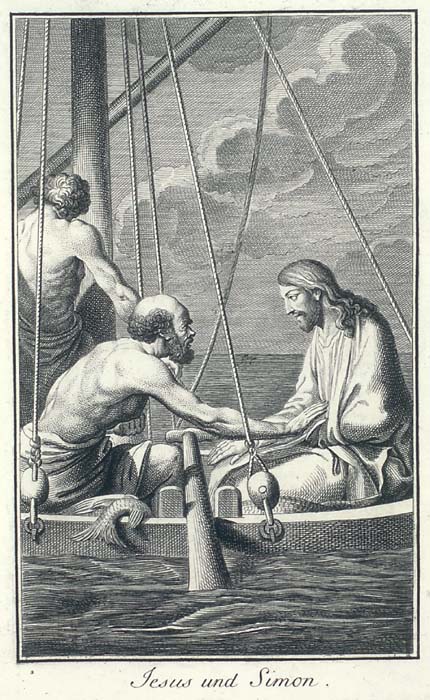Homily of Fr. Paul Panaretos, S.J.
Mystery From the Start
Children and even peers surprise us when we learn some of their interests, interests we never associated with them. When a teacher and friend lectured in Detroit some years ago, we visited and “caught up.” When Aidan asked me what was new, I mentioned that I had been practicing aikido, a Japanese martial art. He reacted briefly, registering his surprise at something he didn’t associate with me, saying, “Madcap, Paul, simply madcap!”
 Another example: my parents knew one another well. They anticipated each other. However, they surprised one another, too. It might be something spoken or a feeling or misgiving one or the other had. Their 60-year partnership in life did not, could not erase the unexpected; nor could it make each less a mystery to the other.
Another example: my parents knew one another well. They anticipated each other. However, they surprised one another, too. It might be something spoken or a feeling or misgiving one or the other had. Their 60-year partnership in life did not, could not erase the unexpected; nor could it make each less a mystery to the other.By “mystery” neither I nor the church mean a whodunit. Our Catholic sense of mystery refers to the essence of a person, which our limited human intelligence cannot grasp. God is mystery; and so are we. My parents remained mysteries to each other in our Catholic use of the word.
Not only are others mysteries to us; in our honest moments we realize we are mysteries to ourselves. Pope John Paul touched on that when he addressed members of the American Psychiatric Association in January 1993. In a few words he captured the “tangled workings” within the “human mystery”:
By its very nature, your work [as psychiatrists] often brings you to the threshold of the human mystery. It involves a sensitivity to the often tangled workings of the human mind and heart, and an openness to the ultimate concerns which give meaning to people’s lives. These are areas of utmost importance to the Church, and they call to mind the urgent need for a constructive dialogue between science and religion for the sake of shedding greater light on the mystery of [humans] in [their] fullness./1/Created as images of God and because the Son of God became human for us as our Messiah Jesus, our mystery is intimately associated with his mystery, which Catholic shorthand names his dying and rising. Our celebrations of Jesus’ mystery here at his table help us associate our human mystery with his divine-human mystery.
 As we begin to immerse ourselves again in Matthew’s portrait of Jesus in our Sunday celebrations, the First Gospel paints Jesus as no ordinary preacher or teacher of things on the edges of human concern. Jesus came preaching, “the kingdom of heaven is at hand.” He was intent on making people whole.
As we begin to immerse ourselves again in Matthew’s portrait of Jesus in our Sunday celebrations, the First Gospel paints Jesus as no ordinary preacher or teacher of things on the edges of human concern. Jesus came preaching, “the kingdom of heaven is at hand.” He was intent on making people whole.Jesus began his ministry by going to that region that had long before been peopled by Gentiles. That swath of land had been invaded before Isaiah and its people exiled. Their captors populated what we call today northern Israel with their own people to tend it and develop it. Jesus himself said his ministry was to the lost sheep of the house of Israel,/2/ yet he began and ended his ministry in Galilee, which many Jews considered on the fringe of the covenant. Indeed, Jesus was a mystery from the start!
Do we interpret lost in a geographic way? Surely not! Christian mystery is not confined to maps. A more real geography exists, the geography of the human heart. Yet the “tangled workings" of our minds and hearts blind us to Jesus and his ultimate concern: to make us whole. Jesus, the Light, dispelled darkness, welcoming us to be light for one another and for all people.
In your daily 15 minutes with Jesus this week, begin by growing more aware how strongly the Trinity loves you at each moment. Ask for the grace to welcome Jesus welcoming you and inviting you to join him. Then neither ignoring nor making excuses for your limitations, allow yourself to recognize Jesus calling you and making you whole by inviting you to join him to proclaim the kingdom of heaven. Savor Jesus’ call to walk his way with him. Finally, end by saying slowly the Lord’s Prayer, which reminds us we depend on God for everything and that we become untangled and whole as we join our mysteries with Jesus’ mystery of his dying and rising.
________________
/1/ John Paul II, Address to Members of the American Psychiatric Association and the World Psychiatric Association, 4 January 1993. Quotation is from paragraph 2 of the pope’s 5-paragraph address.
/2/ Matthew 10.6 and 15.24 relate this strange phrase. It refuses to be easily interpreted and enhances the aura of mystery which surrounds Jesus.
__________________________________________________________
Wiki-image of Jesus and Peter is in the public domain. Wiki-map of Galilee and its region of Ten Cities is used under the GDFL .
No comments:
Post a Comment